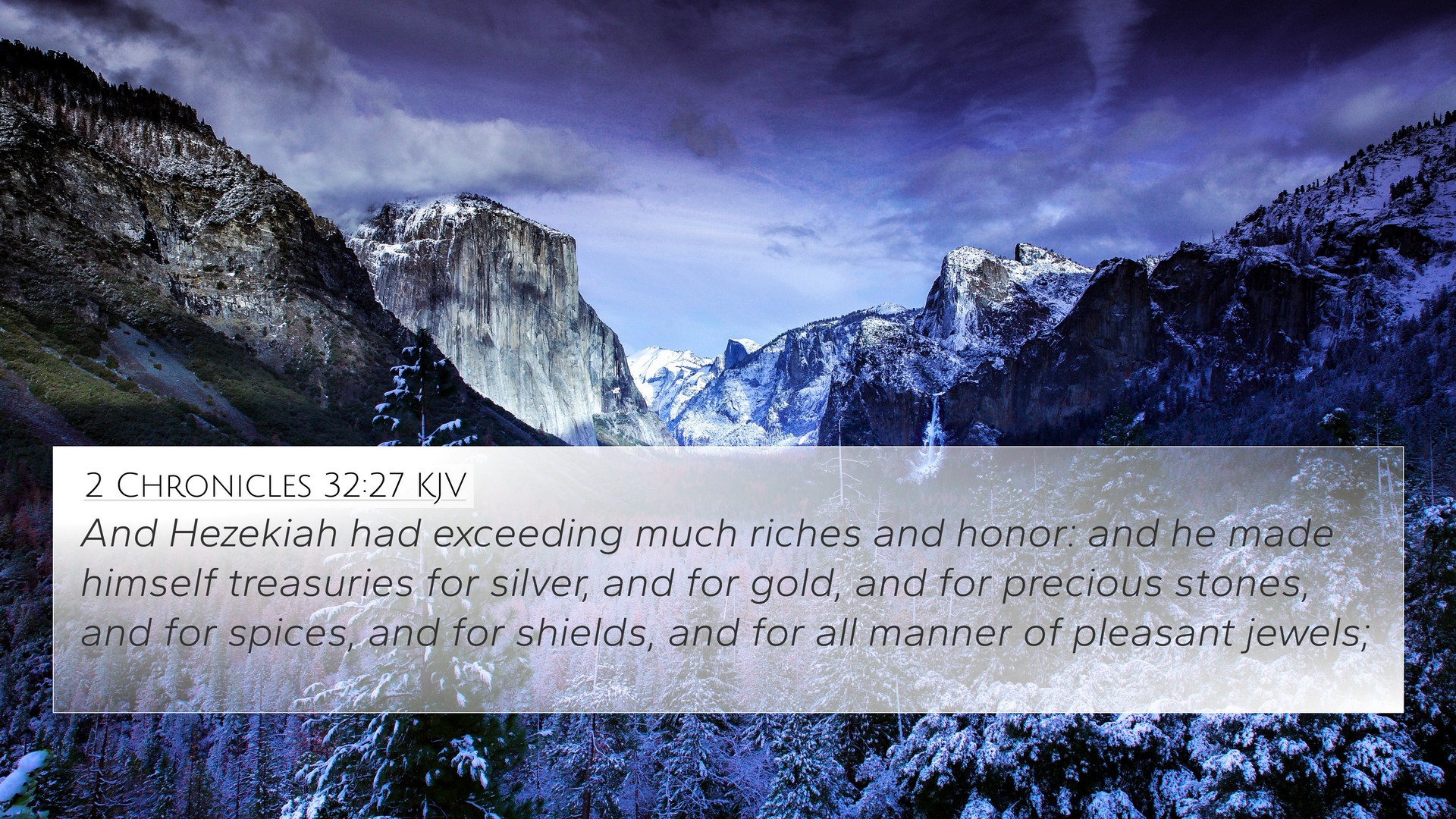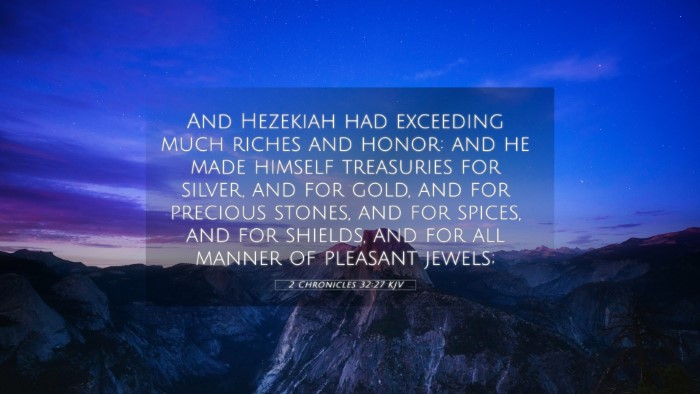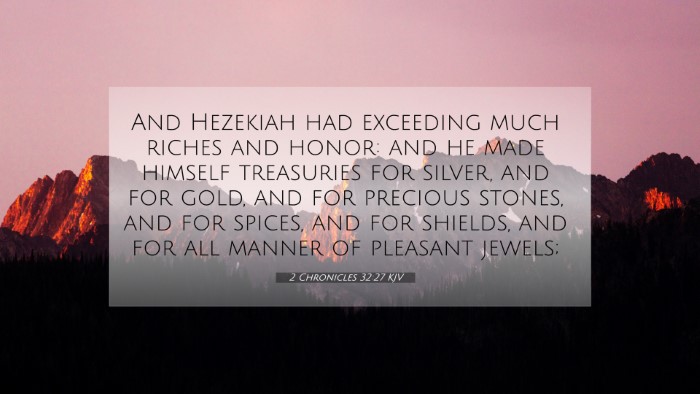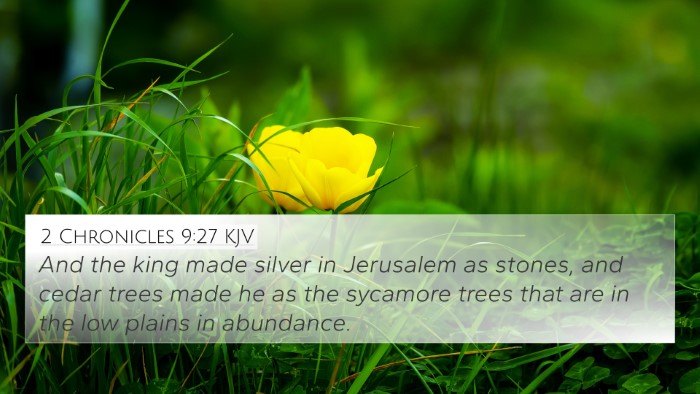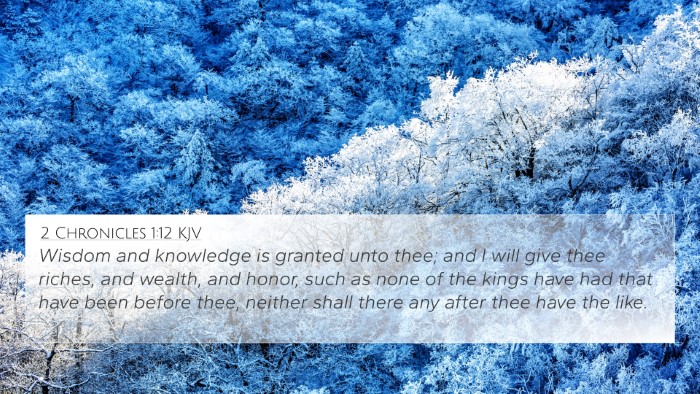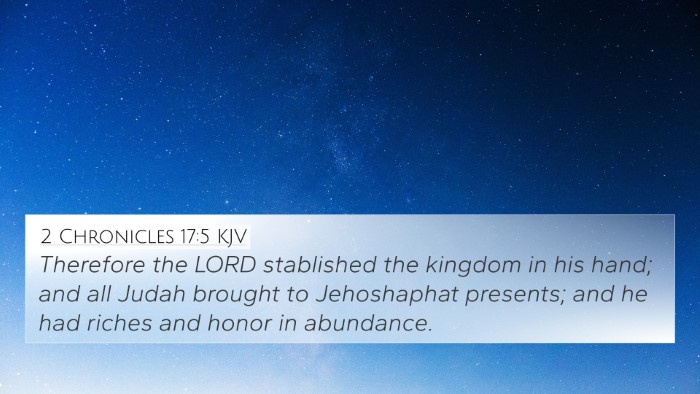Bible Verse: 2 Chronicles 32:27
"And Hezekiah had exceeding much riches and honour: and he made himself treasuries for silver, and for gold, and for precious stones, and for spices, and for shields, and for all manner of pleasant jewels."
This verse highlights the abundant wealth and honors that King Hezekiah amassed during his reign. Understanding its deep meaning involves exploring themes of prosperity, divine favor, and the implications of wealth. Below, we summarize insights from renowned public domain commentaries by Matthew Henry, Albert Barnes, and Adam Clarke, along with cross-references to enhance the interpretation.
Commentary Insights
-
Matthew Henry’s Commentary:
Henry emphasizes the significance of Hezekiah's wealth as a result of God's blessings. He notes that wealth, when used for God's glory, showcases divine favor. However, it can also lead to pride if not wielded with humility. The treasures gathered signify not just material wealth but also the prosperity of God’s kingdom under righteous leadership.
-
Albert Barnes’ Commentary:
Barnes remarks on the importance of wealth accumulating in a righteous king's reign. The verse underlines Hezekiah's foresight in preparing for protection and future needs. His treasures, including silver, gold, and precious stones, serve a dual purpose: to support worship in the temple and to prepare for potential conflict. This balance between material wealth and spiritual commitment is crucial in understanding Hezekiah's leadership.
-
Adam Clarke’s Commentary:
Clarke highlights that such wealth positioned Hezekiah as a significant figure among nations and would have made him a powerful ally or formidable opponent. He reflects on the treasures not only as personal wealth but also as communal resources meant to serve the nation and bolster its defenses, linking its relevance to divine strategy in preserving Israel.
Thematic Bible Verse Connections
This verse relates to various themes in the Bible. The following verses provide context to the wealth of Hezekiah and the biblical understanding of riches:
- Deuteronomy 8:18: "But thou shalt remember the LORD thy God: for it is he that giveth thee power to get wealth..." - This affirms God's role in providing wealth.
- Proverbs 10:22: "The blessing of the LORD, it maketh rich, and he addeth no sorrow with it." - Emphasizing that true wealth comes from God without regret.
- 1 Chronicles 29:12: "Both riches and honour come of thee, and thou reignest over all..." - Recognizing God's sovereignty over wealth and honor.
- 2 Samuel 8:11: "Which also King David did dedicate unto the Lord, with the silver and gold that he had dedicated of all nations which he subdued." - Connecting the theme of wealth with dedication to God.
- Ecclesiastes 5:10: "He that loveth silver shall not be satisfied with silver..." - A warning about the nature of wealth and satisfaction.
- Matthew 6:19-21: "Lay not up for yourselves treasures upon earth..." - Jesus teaches about the eternal value of treasures over earthly riches.
- Luke 12:15: "And he said unto them, Take heed, and beware of covetousness..." - A caution against greed, contrasting true wealth with earthly desires.
Connections Between Bible Verses
The analysis of 2 Chronicles 32:27 reveals its connections with both Old and New Testament scriptures, enriching the understanding of the themes of wealth, wisdom, and divine providence:
- Connections in Old Testament:
- Genesis 13:2: "And Abram was very rich in cattle, in silver, and in gold." - An early instance of God blessing His faithful servant with wealth.
- Proverbs 3:9-10: "Honour the LORD with thy substance, and with the firstfruits of all thine increase..." - Encouraging the dedication of wealth to God.
- Connections in New Testament:
- James 1:17: "Every good gift and every perfect gift is from above..." - Reiterating that all wealth is ultimately from God.
- Matthew 19:23-24: "Jesus said unto his disciples, Verily I say unto you, That a rich man shall hardly enter into the kingdom of heaven..." - Discussing the challenges wealth brings to spiritual health.
Inter-Biblical Dialogue
This verse invites a comparative analysis among various scriptures that address wealth. Acknowledging the relationship and dialogues between biblical texts can illuminate further understanding:
- Luke 16:11: "If therefore ye have not been faithful in the unrighteous mammon, who will commit to your trust the true riches?" - Discussing stewardship of wealth as a measure of faithfulness.
- Philippians 4:19: "But my God shall supply all your need according to his riches in glory by Christ Jesus." - Stressing reliance on God for provision.
Tools for Bible Cross-Referencing
To delve into a deeper study, utilizing tools for Bible cross-referencing can provide a structured approach to understanding biblical texts:
- Bible Concordance: A detailed index of terms and their occurrences can help identify relevant verses.
- Bible Cross-Reference Guide: These guides help map connections among various scriptures for comparative analysis.
- Cross-Reference Bible Study: A methodology for exploring related texts and thematic richness.
Conclusion
Through a comprehensive understanding of 2 Chronicles 32:27, we see that wealth, when aligned with divine purpose, can reflect God's favor and serve His kingdom. By exploring cross-references, we can appreciate the interconnectedness of scripture. The careful study of these connections aids in a richer interpretation and application of biblical principles regarding wealth, stewardship, and divine provisions.
